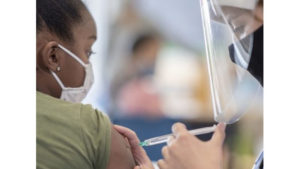 Schoolchildren aged 12 to 17 in Antigua and Barbuda will be offered the Pfizer/BioNTech vaccine for protection against the dangerous Covid-19 Delta variant, when an expected batch of doses arrives on the island in a matter of weeks via the US.
Schoolchildren aged 12 to 17 in Antigua and Barbuda will be offered the Pfizer/BioNTech vaccine for protection against the dangerous Covid-19 Delta variant, when an expected batch of doses arrives on the island in a matter of weeks via the US.
This marks a significant shift from the adults-only vaccination policy that has been in place since the start of the public inoculation programme, but is understandable as the Pfizer/BioNTech is currently the only Covid jab approved by the World Health Organization for use in children.
The announcement was made in this week’s post-Cabinet report, with the body saying it intends to “ensure that as many students age 12 and older in fourth and fifth forms, receive the vaccine”.
The exact date of arrival for the Pfizer doses is not yet known, therefore a start date for the student vaccinations cannot yet be set.
What Cabinet spokesperson, Information Minister Melford Nicholas did confirm, yesterday, was that the shot would not be mandatory for the students, but as many as possible would be encouraged to put themselves forward to receive them.
To that end, he claimed that there is already significant interest among the youth population to acquire the vaccines.
Currently, there are doses of the Oxford/AstraZeneca, the Sinopharm and the Sputnik V vaccines being utilised in the public vaccination programme.
Due to the sensitive nature of vaccinations in children – and the fact that age group will be receiving the Covid-19 vaccines in the country for the first time – the Minister assured that special emphasis will be placed on the process of administering the Pfizer doses, to ensure they are the only ones actually given to the youth who come forward.
“The Minister of Health did indicate that they are going to have discreet clinics that provide access to the Pfizer vaccine. I imagine that, specifically, the storage facility that is required for the Pfizer vaccine is a little different to the others, and [on Wednesday] the Acting Chief Medical Officer did indicate to us that the medical professionals have to go through a specific layer of training to be able to apply that particular vaccine.
“So, if a person chooses to go for the Pfizer vaccine, then clearly there will be certain clinics and I imagine that there will not be mixing of those distribution regimes, to be able to ensure that [wrongful application] is avoided,” Nicholas explained.
Another major change that could come into effect as a result of this adjustment in vaccination policy, is the vaccinated students being included in the figures toward the herd immunity goal.
Previously, the goal was stated as having approximately 70-80 percent of the adult population vaccinated, but Nicholas said that may not stay the same.
“I guess we will have to give consideration to changing the number. The formula will change a little bit now, because we will no longer need to discount the student population, which is approximately 22,000 persons.
“The absolute attainment of any take-up in that particular population would actually add to the number of persons that are immune, and the composite picture would present us with an attainable goal of achieving 80 percent of our population for herd immunity, which will take us up now beyond 65,000 to 80,000 persons.”
Along with the threat posed by the Delta variant, the urgency of the vaccinations for children follows the death of a seven-month-old, who became the youngest person in Antigua and Barbuda to contract Covid-19.
It is not yet clear, however, whether the infant was afflicted with the Delta variant of the virus, or whether the Covid-19 infection was the actual cause of death.
The Delta variant has been linked to more hospitalisations among young people than other strains.
